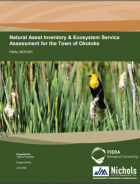Dr. Cathryn Ryan, Department of Geoscience, University of Calgary, describes what happens with groundwater during flooding events. Flooded basements are on the insurance companies' radar after the 2013 southern Alberta floods. While overland flow is one contributor to basement flooding, the groundwater component is not well understood. Calgary's alluvial aquifers are both susceptible to pollution from suburban development and to basement flooding. Which is why urban development on these river-connected alluvial aquifers is problematic. Flood proofing buildings usually doesn't account on flooding from alluvial aquifers with high watertables from flood waters. Watertables do respond quickly in the highly permeable alluvial aquifers to high flood levels in the river.
Dr. Ryan describes two undergraduate environmental science students' surveys of residents after the 2005 flood in the Rideau-Roxboro subdivision and in the Tsuu T'ina First Nation's Redwood Meadows subdivision after the 2013 Elbow River flood.
Paleochannel aquifers also transmit high watertables from flood levels. Homes built on alluvial aquifers whose basements are below the watertable level at flood stage are likely to flood. The watertable pressure can overwhelm even well sealed basements. Sump pump and basement cracking failures are common. Sewer backup may actually be watertable basement flooding.
Dr. Ryan's presentation was part of the Canadian Water Resources Association's (Alberta Chapter) conference on the 2013 Alberta Floods, The Rains, Response, Recovery & Resiliency, March 23-25, 2014 in Calgary, Alberta.





